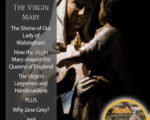
Here’s the full version of your monthly magazine packed with Tudor goodness, you’ll love this magazine which focuses on the role of the Virgin Mary in Tudor times.
[Read More...]
Here’s the full version of your monthly magazine packed with Tudor goodness, you’ll love this magazine which focuses on the role of the Virgin Mary in Tudor times.
[Read More...]
On this day in Tudor history, 30th April 1544, in the reign of King Henry VIII, Thomas Audley, Baron Audley of Walden and Lord Chancellor, died at his home in London.
Audley was Thomas Cromwell’s right-hand man in 1536, during the fall of Anne Boleyn, and became even more important after Cromwell’s fall.
Find out more about Thomas Audley, an important Tudor statesman, and how he served King Henry VIII, in today’s talk.
[Read More...]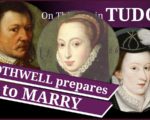
On this day in Tudor history, 29th April 1567 (some sources suggest 26th), James Hepburn, Earl of Bothwell, who had recently abducted and allegedly “ravished” Mary, Queen of Scots, had a suit of divorce made against him by his wife, Lady Jean Gordon.
Lady Gordon was persuaded by Bothwell to make this divorce suit as he was planning to marry Mary, Queen of Scots, which he did on 15th May 1567.
In this talk, I explain what led up to this day, what happened next, and also what a truly horrible man Bothwell was.
[Read More...]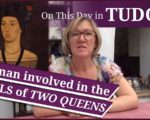
On this day in Tudor history, 28th April 1548 (some sources say 6 May), courtier, diplomat, soldier and Keeper of Oatlands Palace, Sir Anthony Browne, died at Byfleet in Surrey. He had been one of Henry VIII’s most important and richest courtiers and was also involved in the falls of two queens: Anne Boleyn and Anne of Cleves.
Find out more about this man and how he was involved in the falls of the two Annes in today’s talk.
[Read More...]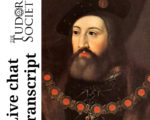
Thank you, as always, to the growing number of members who came to our live chat event with Sarah Bryson. We had a fun time talking about the Brandons.
[Read More...]
On this day in history, actually in the Stuart period, 27th April 1609, Sir Edward Michelborne, member of Parliament, soldier and adventurer, died.
He’d survived an unsuccessful naval campaign against the Spanish, being implicated in a rebellion, and an attack by pirates, to die a natural death at his home in Hackney.
Find out more about Sir Edward Michelborne in today’s talk.
[Read More...]
On this day in Tudor history, 26th April 1564, the Bard, William Shakespeare, was baptised at Holy Trinity Church, Stratford-upon-Avon, Warwickshire. This was just three months before the plague hit the town, wiping out a fifth of its population. Fortunately for him, and us, Shakespeare didn’t catch it – phew!
Find out more about the plague and its outbreak in Stratford-upon-Avon in today’s talk.
[Read More...]
Today’s Sunday brain-stretcher is a crossword puzzle testing your knowledge of Medieval and Tudor crime and punishment. A lovely subject for a Sunday! How much do you know about this interesting topic? Find out with this fun crossword. Good luck!
Simply click on the link or image below to open and print out.
[Read More...]
On this day in Tudor history, 25th April 1544, an English translation of John Fisher’s Latin work, “Psalms or Prayers”, was published. It had been translated by none other than Catherine Parr, Henry VIII’s sixth and final wife.
It was published anonymously, but there’s rather a lot of circumstantial evidence pointing towards Queen Catherine as the translator. Find out more in today’s talk.
[Read More...]
Today, 24th April, is St Mark’s Eve, the day before the Feast of St Mark the Evangelist, one of Christ’s apostles and the man who is said to have written the Gospel of Mark. In medieval and Tudor times, St Mark’s Eve was the night to divine who you were going to marry.
How did people go about divining their future partner?
Find out in today’s talk and do let me know if you try any of these divination methods!
[Read More...]
As many people around the world are in some kind of lockdown at the moment – sorry to remind you! – I thought for this week’s Claire Chats that I’d talk about house arrest, something which quite a few people experienced in Tudor times.
[Read More...]
Now even though many of you know me well, I thought you might be interested in this Q&A session that I did on my YouTube channel.
[Read More...]
On this day in Tudor history, 23rd April 1536, St George’s Day, George Boleyn, Lord Rochford, lost to Nicholas Carew in the Order of the Garter elections.
George Boleyn was, of course, the brother of Queen Anne Boleyn, so how did he lose, and was this a sign of the beginning of the end for the Boleyns?
Find out what exactly happened in today’s talk.
[Read More...]
On this day in Tudor history, 22nd April 1542, Henry Clifford, 1st Earl of Cumberland, magnate and Warden of the West Marches, died.
This Knight of the Garter had a successful career, although he was imprisoned once and upset the king on at least one occasion. He was also described as a greedy landlord.
Find out more about Henry Clifford, Earl of Cumberland, in today’s talk.
[Read More...]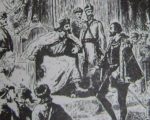
Richard Chancellor is a Tudor explorer famous for his interactions with Russia. His origins and childhood are mostly unknown, and as such, there is a lot of speculation. We believe he was born in 1521 and lived near Bristol. It is claimed that he was raised by Sir Henry Sidney, Lord Deputy of Ireland.
In the 1550s, Chancellor sailed with Roger Bodenham as an apprentice pilot in the voyage of the Bark Aucher to the Levant. This trip was intended to provide English mariners with the experience of longer voyages, something that they were less experienced in than their French and Spanish counterparts. By 1553, English markets were becoming more diverse, and there was increased demand for cloth from the Far East. As such, merchants, courtiers, and noblemen funded an expedition to the East, which consisted of three ships – the Bona Esperanza, Edward Bonaventure, and the Bona Confidentia. Richard Chancellor was appointed as the pilot general of the voyage and as captain of the Edward Bonaventure, the largest ship in the expedition. The voyage departed on 22nd May 1553 but was delayed for several weeks in Harwich due to faulty casking. Eventually, they set sail on 23rd June, and the ships progressed towards the Norwegian coast. The leaders of the expedition agreed to meet at Vardö should they become separated; however, they were all scattered by a vicious storm. Chancellor arrived at the town and waited seven days for the others to come, but no one did. Richard set sail from Vardö and arrived at the Russian port town of St Nicholas towards the end of August 1553.
[Read More...]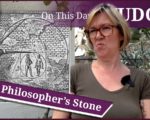
On this day in Tudor history, 21st April 1581, alchemist Thomas Charnock was buried at Otterhampton in Somerset.
Charnock was obsessed with alchemy and claimed to have made the philosopher’s stone, which he offered to Queen Elizabeth I in exchange for financial support.
Find out more about Thomas Charnock, his work on alchemy, and the philosopher’s stone, in today’s talk.
[Read More...]
On this day in Tudor history, 20th April 1578, Lady Mary Keys (née Grey), sister of Lady Jane Grey and wife of Thomas Keys, died at her home in the parish of St Botolph without Aldgate, London.
Like her sisters, Mary had a sad life. Her secret marriage led to Elizabeth I imprisoning her and her husband, and they never saw each other again.
Find out more about the tiny Mary who was described as “crook-backed”, her marriage to a man who was said to be 6’8, and what happened to Mary and Thomas, in today’s talk.
[Read More...]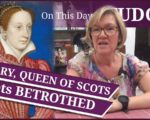
On this day in Tudor history, 19th April 1558, fifteen-year-old Mary, Queen of Scots and fourteen-year-old Francis, the Dauphin, son of King Henry II of France, were formally betrothed at the Louvre Palace in Paris.
This betrothal was just five days before their wedding and was a lavish affair, celebrated with a ball.
Find out more about the betrothal, the bride and groom, and arrangements for their marriage, in today’s talk.
[Read More...]
Being under lockdown makes me empathise with those Tudor people who upset the monarch and were kept under house arrest. Some of them spent years under house arrest and some were never given their freedom back. It really doesn’t bear thinking about, does it?
This week’s Sunday quiz tests your knowledge of those Tudors who had to suffer this punishment. How much do you know about them, their circumstances and where they were kept? Test those little grey cells with this fun quiz – good luck!
[Read More...]
In the latest edition of Teasel’s Tudor trivia, Teasel and I explain what Tudor babies and toddlers wore after they’d grown out of being swaddled.
Did boy and girl toddlers wear different clothes? What did Tudor children’s clothes consist of?
Find out about Tudor children’s clothes for toddlers in today’s talk.
[Read More...]
Ok, so they didn’t physically bump into each other, but on this day in Tudor history, 18th April 1536, just a month and a day before Anne Boleyn’s execution, imperial ambassador Eustace Chapuys was manoeuvred unto a position where he was forced to pay reverence to Queen Anne Boleyn, the woman he referred to as “the concubine”. By paying her reverence, he was acknowledging her as queen, something that he had managed to avoid doing until now.
What happened and how did Chapuys get into this awkward position?
Find out in today’s talk.
[Read More...]
Back in January, before all the lockdown happened, our roving reporter, Philippa Lacey Brewell, went to Peterborough Cathedral to visit the tomb of Katherine of Aragon and to show us around this wonderful cathedral.
[Read More...]
It’s Friday and I think we’re due some fun, aren’t we? Let’s have it at Tim’s expense, he doesn’t mind.
Here’s our latest Tudor History Challenge! Do play a long. Give yourself a point for each correct answer and there’s a bonus point if you get both parts of question 7 correct. The answers are at the bottom of this post so don’t scroll down and cheat!
[Read More...]
On this day in Tudor history, 17th April 1595, or according to some sources 7th April, in the reign of Queen Elizabeth I, Jesuit Henry Walpole was hanged, drawn and quartered in the city of York. Walpole had been accused of three counts of treason.
Walpole felt that he’d been given a sign at the execution of Edmund Campion to carry on Campion’s work, and, like Campion, his religious mission led him to his death.
Find out about the sign, what Walpole did, how he suffered awful torture, and about his sad end, in today’s talk.
[Read More...]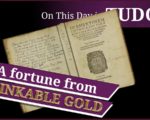
On this day in Tudor history, 16th April 1550, alchemist, apothecary and physician Francis Anthony was born, probably in London. He had a rather eventful life, being imprisoned on several occasions, and he made his fortune from his invention aurum potabile, drinkable gold, which he claimed had amazing curative powers.
Find out more about Francis Anthony and why he ended up in prison in today’s talk.
[Read More...]
On this day in Tudor history, 15th April 1545, Sir Robert Dymoke, champion at the coronations of Henry VII and Henry VIII, and a man who served in the households of Queens Catherine of Aragon and Anne Boleyn, died.
He had an interesting career and survived being suspected of involvement in the 1536 Pilgrimage of Grace rebellion.
Find out more about Sir Robert Dymoke, champion at the coronations of three kings, in today’s talk.
[Read More...]
In this special video, I compare Covid-19, Coronavirus, which is causing havoc here in 2020, to the Sweating Sickness epidemics in England in the 16th century.
Are Covid-19 and Sweating Sickness similar? Are they the same illness?
Find out more in this talk.
[Read More...]
On this day in Tudor history, 14th April 1565, in the reign of Queen Elizabeth I, astrologer, astronomer, mathematician and magician, Edward Gresham, was born in Stainsford, Yorkshire.
Gresham is known for his treatise “Astrostereon” and his almanacs, but what’s really interesting is his connection to a countess’s annulment and a poisoning.
Find out more about Edward Gresham in today’s talk.
[Read More...]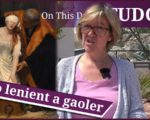
On this day in Tudor history, 13th April 1557, in the reign of Queen Mary I, John Brydges, 1st Baron Chandos of Sudeley, landowner, soldier and Lieutenant of the Tower of London, died at his home, Sudeley Castle in the Cotswolds.
He served Henry VIII, King Edward VI and Mary I loyally, and even managed to keep royal favour after being accused of being too lenient with prisoners Lady Jane Grey and Princess Elizabeth (future Elizabeth I).
Let me tell you more about Brydges and his time in charge of Lady Jane Grey and Elizabeth I.
[Read More...]
On this day in Tudor history, 12th April 1550, in the reign of King Edward VI, courtier and poet, Edward de Vere, 17th Earl of Oxford, was born.
In today’s talk, I introduce Edward de Vere, Earl of Oxford, and talk about his not-so-nice personality, the Oxfordian theory regarding the works of William Shakespeare, and the idea that Oxford was actually Elizabeth I’s son by Thomas Seymour.
[Read More...]